Treatment of Pancreatic Cancer with Whipple Procedure (pancreaticoduodenectomy)
Treatment prices are regulated by national law of the corresponding countries, but can also include additional hospital coefficients. In order to receive the individual cost calculation, please send us the request and medical records.
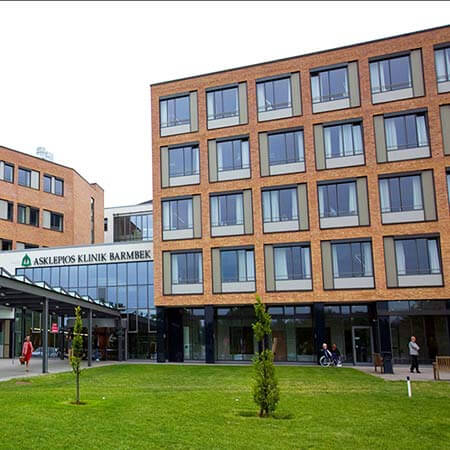
Department of General and Abdominal Surgery, Hepatopancreatobiliary Surgery and Hernia Surgery
The Department of General and Abdominal Surgery, Hepatopancreatobiliary Surgery and Hernia Surgery offers the full range of services in the areas of its specialization. The department's surgical team successfully performs interventions for diseases of the stomach, esophagus, small intestine, large intestine, rectum, pancreas, liver, gallbladder, and bile ducts. Patients with various types of hernias, including inguinal, umbilical, and incisional hernias, are also operated on here. It should be noted that the department also performs cytoreductive surgery with hyperthermic intraperitoneal chemotherapy (HIPEC), which is an advanced treatment method for peritoneal carcinomatosis. The specialists at the medical facility strive to provide patients with not only effective but also as sparing treatment as possible. That is why the use of minimally invasive surgical techniques is a priority. Such an approach to treatment practically eliminates surgical risks and reduces the duration of a hospital stay. The department has the status of an Expert Center for Liver and Pancreatic Surgery as well as a Competence Center for Upper Gastrointestinal Surgery, which is confirmed by the certification from the German Society for General and Visceral Surgery (DGAV). In addition, the medical facility regularly demonstrates high success rates in the surgical treatment of gastrointestinal cancers, which are confirmed by the certification from the German Cancer Society (DKG).
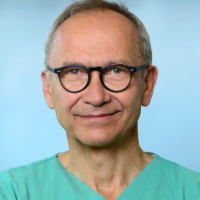
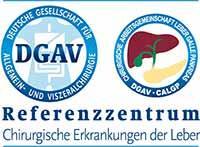



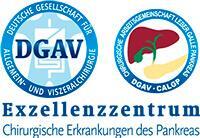

Department of General, Abdominal Surgery and Surgical Oncology
The Department of General, Abdominal Surgery and Surgical Oncology offers the full range of services in these medical fields. Whenever possible, operations are performed using minimally invasive techniques, which are the gold standard of modern surgery. The outstanding quality of medical care is confirmed by numerous prestigious certificates, including certificates from the German Cancer Society, the German Hernia Society, etc. In addition, the department provides innovative hyperthermic intraperitoneal chemotherapy (HIPEC), which is available only in the most progressive clinics in Europe.
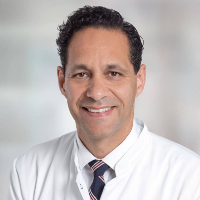




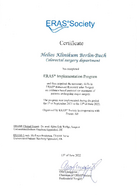

Department of General and Abdominal Surgery, Colorectal Surgery, Hepatopancreatobiliary Surgery, Hernia Surgery and Bariatric Surgery
The Department of General and Abdominal Surgery, Colorectal Surgery, Hepatopancreatobiliary Surgery, Hernia Surgery and Bariatric Surgery provides the full range of surgical treatment in its field of competence. The department's highly qualified surgeons annually perform about 2,000 surgical interventions. Extensive clinical experience allows the specialists to perform even particularly complex operations. The department’s advanced operating rooms serve for surgery to treat gastrointestinal diseases, liver, gallbladder, bile duct, pancreatic, rectal, anal and colon pathologies. The medical facility also successfully performs operations to treat hernias: inguinal, umbilical, and anterior abdominal wall hernias. In addition, the department's doctors deal with the surgical treatment of morbid obesity. Minor traumatic laparoscopic interventions are considered the gold standard, which guarantee a patient minimal risks and rapid postoperative restoration. Surgeons tell the patient in detail about their upcoming treatment and, in every possible way, support them in their recovery.
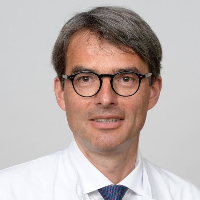





Pancreatic cancer is considered one of the most aggressive cancers. Life expectancy statistics for patients with this diagnosis remains one of the most poor ones.
Content
- Features and functions of pancreas
- Treatment of Pancreatic cancer with Whipple procedure (pancreaticoduodenectomy)
- What is the Whipple procedure (pancreaticoduodenectomy)?
- Whipple procedure (pancreaticoduodenectomy) methods
- How is pancreaticoduodenectomy carried out?
- Benefits of Whipple procedure
- Preparation and preoperative clinical examinations
- Indications for Whipple procedure (pancreaticoduodenectomy)
- Contradictions
- What happens after the surgery?
- Postoperative period
- The cost of the Whipple procedure
- Where can I undergo the Whipple procedure abroad?
- How can I undergo the Whipple procedure abroad?
Features and functions of pancreas
The pancreas is a small organ located deep in the abdomen, under the stomach and behind the duodenum. It is divided into three parts: the head (adjacent to the duodenum), the body and tail (located next to the spleen).
The pancreas secretes several important biological substances, including the hormones responsible for regulating blood sugar levels, as well as some enzymes (referred to as "pancreatic juices"), such as amylase and lipase, which are involved in the breakdown of food.
Treatment of Pancreatic cancer with Whipple procedure (pancreaticoduodenectomy)
The symptoms of pancreatic cancer differ depending on where the cancer is located in the pancreas. Pancreatic cancer may not cause any symptoms at an early stage. As cancer progresses, symptoms appear gradually. Therefore, pancreatic cancer is rarely diagnosed early.
As with any disease, early diagnosis is very important in pancreatic cancer. Over some time, pancreatic cancer causes symptoms such as the upset stomach, bloating, and abdominal pain. But if these signs are ignored, then cancer continues to progress, the symptoms intensify, and only at this stage a patient seeks medical help.
Pancreatic cancer is diagnosed with the help of screening, blood tests, and imaging techniques. These methods provide information about the stage of the disease and the size of the tumor. Since pancreatic cancer is typically detected at an advanced stage, it is important to identify whether cancer has spread to other organs. The treatment scheme mostly depends on the fact of metastases presence.
If the pancreatic cancer tumor is operable, it will be removed by surgery. If the tumor is large, it can be reduced with chemotherapy or radiation therapy and, in some cases, with surgery.
What is the Whipple procedure (pancreaticoduodenectomy)?
Perhaps the most radical and effective way to treat diseases of the head of the pancreas is a pancreaticoduodenectomy or Whipple procedure, which is rightfully one of the most complex interventions in abdominal surgery.
Pancreaticoduodenectomy or Whipple procedure is used for the treatment of benign and malignant neoplasms found in the head of the pancreas.
Pancreatic cancer has a reputation of incurable disease among many doctors, and as a result, many patients are not suggested the treatment they need. A recent US study found that only 30% of patients with cancer were curated to undergo the surgery when it could be helpful.
Many doctors mistakenly consider the Whipple procedure (pancreaticoduodenectomy) for pancreatic cancer as one of the dangerous procedures. Indeed, 10-20 years ago, this operation had a high mortality rate and only a few surgeons performed it professionally. Today, surgeons specializing in pancreatic cancer operations are fluent in the Whipple procedure, and the mortality rate has dropped to 2-4%.
The Whipple procedure (pancreaticoduodenectomy) is a very complex operation that requires a lot of experience and a certain skill level from the surgeon. When surgery is performed in small hospitals or by doctors with little experience, up to 15% of patients with pancreatic cancer can die as a result of surgical complications.
However, when surgery is performed in the specialized cancer centers by experienced surgeons, less than 5% of patients with pancreatic cancer die as a direct consequence of the surgery.
To get the best possible result, it is important to be treated by a surgeon who is experienced in the Whipple procedure and in the best hospitals in the field.
Although a part of the pancreas is going to be removed during surgery, there is usually enough of the remaining pancreas to produce hormones and digestive enzymes.
Whipple procedure (pancreaticoduodenectomy) methods
Whipple procedure can be carried out in the following ways:
- Open surgery
The surgeon makes an incision in the abdominal wall to access the pancreas. This is the most studied and common approach.
- Laparoscopic and robotic surgery
This is a minimally invasive intervention, during which surgical instruments are manipulated by a robot. The surgeon directs the actions of the robot using the control panel. The surgical robot can reproduce very precise and complex movements and manipulate in the areas of the body for which human hands are too large.
Minimally invasive surgery has several advantages, such as the lower risk of blood loss and surgical complications, as well as faster patient recovery. Nevertheless, it can also take more time, which puts additional stress on the body. Sometimes the operation can start with a minimally invasive method, but the risk of complications forces the surgeon to complete the operation openly.
Before the Whipple procedure, the surgeon will explain in detail how it will go and what to expect after. Sometimes, chemotherapy or radiation therapy may precede Whipple procedure (pancreaticoduodenectomy) for pancreatic cancer treatment. In some cases, these clinical treatments are prescribed after surgery.
How is pancreaticoduodenectomy carried out?
Whipple procedure can be performed in two ways, under general anesthesia in both:
- Conventional (open) surgery through an incision in the abdominal cavity
- Laparoscopic intervention through small punctures in the abdomen
During the operation, the surgeon removes the head of the pancreas and sometimes the body of the pancreas. Nearby structures such as part of the small intestine, part of the bile duct, gallbladder, lymph nodes near the pancreas, and sometimes part of the stomach can also be removed.
The remaining bile ducts and pancreas are then attached to the small intestine so that bile and digestive enzymes can still move through the small intestine. The stomach and small intestine are then connected so that food can pass through the digestive tract (intestines).
Diagnostic laparoscopy is sometimes performed before surgery, which allows the surgeon to visually assess the spread of cancer outside the pancreas. If the tumor has metastasized, the surgeon may decide not to proceed with the surgery.
The goal of all types of pancreatoduodenectomy is the same – the removal of the tumor and part of the pancreas, duodenum, and, if necessary, parts of the stomach and gallbladder. The tissues of the removed parts of the gastrointestinal tract are then connected to restore the patency and integrity of the stomach, duodenum, bile ducts, and pancreatic ducts.
The clinical procedures are performed only in a hospital, under the supervision of the teamwork of surgeons and oncologists. The duration of the surgery depends on the complexity and usually is more than 3 hours.
Benefits of Whipple procedure
- The entire tumor is removed
- The ducts of the pancreas and biliary tract are restored
- Practically the only effective method of treating pancreatic cancer
Preparation and preoperative clinical examinations
Before the operation, the patient undergoes an extended preoperative examination. It includes several standard procedures:
- Clinical and biochemical blood tests
- General urine analysis
- Blood tests for HIV, hepatitis B and C, syphilis
- ECG
Besides that, you’ll need to:
- Undergo CT-scan of the abdominal and chest cavity organs
- Do cancer screening – MRI, CT, ultrasound, a blood test for tumor markers
With the results, you’ll need to go to a therapist and surgeon, as well as visit an anesthesiologist, because the intervention is carried out under general anesthesia.
Indications for Whipple procedure (pancreaticoduodenectomy)
- Cancer tumors of the head of the pancreas
- Cancer tumors of the greater duodenal papilla
- Cancer tumors of the duodenum
Contradictions
- Severe and decompensated general therapeutic diseases
- Cachexia, including cancerous one
- Metastases of cancer
What happens after the surgery?
At the end of the surgery, the patient is transferred to the recovery room for two hours so that he can gradually recover from the anesthesia. Then he stays in the intensive care unit, where he is under constant medical supervision for about a day. After that, he is admitted to the surgery department. Whenever possible, the patient is encouraged to move and walk.
Such surgeries usually require hospitalization for 1-2 weeks.
Postoperative period
After Whipple surgery and associated changes in the digestive system, some patients with former pancreatic cancer lose weight significantly. As a rule, within about a month and a half, the digestive system manages to adapt to its new structure and it resumes normal functioning. Therefore, in the postoperative period, patients are advised to eat in small portions and have a snack between meals.
Besides, after the pancreas is resected (especially in cases when the spleen was also excised), patients with pancreatic cancer will be vaccinated to support the immune system.
If the pancreas does not produce enough digestive enzymes after surgery, a patient may develop diarrhea. In this case, a patient may need to take enzyme tablets with food.
If the pancreas doesn't produce enough insulin after surgery, a patient may have high blood sugar. This is extremely rare, but if a patient has high blood sugar after surgery, his healthcare team will support him.
The cost of the Whipple procedure
Even though the procedure is very complicated and complex, its cost in hospitals listed on the Booking Health website is relatively low. As a rule, you can save up to 30-40% of the price by applying for the treatment here.
The hospitals that are represented by Booking Health are trying to make high-tech and complex types of surgery available to the largest possible number of foreign patients with pancreatic cancer at a lower price. Therefore, they are pursuing a cost policy focused primarily on the interests of the patients.
With Booking Health, you can book the Whipple procedure treatment for pancreatic cancer at an affordable price. The cost of the procedure varies in different countries, but we can arrange a trip at a fair price. The cost of pancreatic cancer treatment with Whipple procedure goes as follows:
| Country | Range of prices |
|---|---|
| Germany | from 32,181 EUR to 52,560 EUR |
| Israel | about 31,001 EUR |
| Turkey | from 17,993 EUR to 18,032 EUR |
| South Korea | from 22,424 EUR to 22,565 EUR |
Where can I undergo the Whipple procedure abroad?
Among foreign hospitals, the best success rates in Whipple procedure for pancreatic cancer treatment are shown by:
- Academic Hospital Asklepios Barbek Hamburg, Germany
- Academic Hospital Brothers of Charity Munich, Germany
- Tel Aviv Sourasky Medical Center, Israel
- Medipol Mega University Hospital Istanbul, Turkey
- Samsung Medical Center Seoul, South Korea
How can I undergo the Whipple procedure abroad?
Organizing undergoing of the Whipple procedure abroad by oneself can be challenging. It requires specific knowledge and experience in medical tourism. It is safer, easier, and less stressful to shift some responsibility onto a medical tourism agency that can support you throughout your journey.
Booking Health is the largest and most transparent medical tourism agency in the world. Treatment abroad is arranged by direct cooperation with leading foreign hospitals.
To undergo the Whipple procedure for pancreatic cancer treatment, please leave a request on our website. We will contact you and provide you with all the information necessary.
Authors: Dr. Nadezhda Ivanisova, Dr. Sergey Pashchenko

